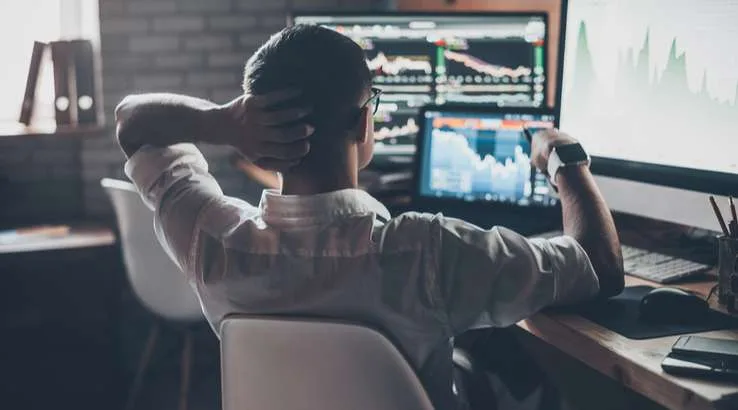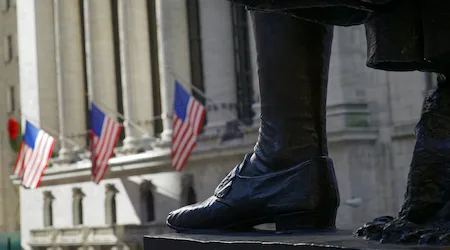How to become a successful day trader
An active day trader reveals his best tips, tricks and advice to turn trading the markets into a permanent income stream.
Have you been buying and selling shares a lot more frequently this year due to increased market volatility? Perhaps you've even made a nice amount of money doing so. If so, you might be toying with the idea of doing it on a more permanent basis.
The idea of being a full time day trader, or at least doing it as a more permanent side hustle, can be appealing for a lot of reasons. There's the flexibility of trading from anywhere, at almost any time and having complete control over your trading decisions. And, perhaps the biggest drawcard, the potential for large and fast profits. Of course, this isn't true for everyone and a lot of day traders, both new and experienced, end up losing more than they ever earn.
But how do you go from being an investor to a trader? Finder spoke with Justin Michael who has done just that, to learn how he went from investor to trader and get his tips for anyone else considering doing this too.
"My trading journey started back in high school in year 8 when I began trading sneakers. Then I delved into the bigger market of sneaker reselling, which I still do today. In doing so I built a trading mindset. I saw how you can purchase things, they can increase in value and then you can sell them to make profits," said Justin.
"Once I turned 18 I jumped into stocks and just dabbled in it. I didn't really know what I was doing until I started learning more and analysing the charts for foreign exchange markets and stock markets and now it's become a second and third stream of income for me."
Here are his best tips for becoming a successful day trader.

Pick your markets and practise, practise, practise
You can trade a lot of different things, from stocks and commodities to indices, foreign exchange (FX) and cryptocurrency. Instead of trying to become an expert at trading everything, it's a good idea to pick the market you're most interested in and focus on that.
"My main market is the FX market because it's so active. You can be making money on the go every day. You could buy a stock today and it might drop then not reach back to your break-even price for a year. Whereas when I was trading FX, I could be making the same amount of money within a couple of hours," said Justin.
Once you've picked the market you want to trade the next step is to practise.
"My number one tip is to practise before you start. You have to jump onto the charts and really get a good feel for it. Use a demo account and build confidence. I stayed on my demo account for two months practising reading the charts and testing different strategies and understanding how the markets work. There are heaps of free courses online that will teach you the very basics of forex and stocks. But it's pretty much just practice."
A lot of the larger brokers offer demo trading accounts so you can hone your skills before you dive in. For example, IC Markets offers a free demo account with access to MetaTrader4, the world's most popular FX trading platform, so you can get familiar with the software and the different trading tools.
Set yourself specific targets, and stick to them
You can't go in blind and hope for the best. You need to develop a trading strategy that works for you and stick to it. This means deciding how much money you want to trade in a given day, and when to take your profits.
"I work out my daily goal as a percentage of my return. So let's say I have $200 capital and I need 20% profit a day, that's $40. So once I hit my $40 profit that day I stop. If I have a daily goal of a 20% return on investment, and I make that goal in a few trades, then I won't trade any more for that day. Because then I'll start to get greedy," said Justin.
Equally important is deciding when to cut your losses. There are tools available such as stop losses that allow you to pre-set the price at which you want to exit a trade to prevent losing too much money. This means you don't have to worry about your emotions telling you to keep holding "just a little longer", the stop loss will exit the trade automatically.
"I set my risk less than my profits. So if I was going to make 20% profit in a day, I might only want to risk losing 5% of my account. And if I lose 5% of my account in a day I'd stop trading for the day. Because it can go very quickly south from there!"
Don't get greedy or become a victim of FOMO
Justin said the biggest mistake he made when starting out as a trader was letting himself get too greedy.
"There were times when I would see a good trade and I'd risk so much more than I ever should. I've blown many accounts and it wasn't until I really became disciplined and followed a strict schedule and focused on compounding small profits that I started to make a bigger profit at the end of a week," he said.
"If I know one day the trades aren't working at all and I'm having no luck, then I'd just stop. Because you get FOMO. So I would just stop, reset and wait until I see something good again. Because at the end of the day you don't want to blow your account just because you have the fear of missing out on a trade."
Do your research and don't let your emotions take over
News and current events are heavy drivers for what the markets are going to do, so it's important to stay on top of it if you want to be a successful day trader. If you want to turn trading into a permanent income stream, you need to consider keeping up with the news as part of the job.
"A lot of traders, before they place a trade, will go online and see the latest news for the currency pairs that they want to trade, or when you're trading stocks you look at the latest news for the company. From that you can see how it drives the market to do something. If you see there's negative news, so if we saw in Australia there were a bunch of new COVID-19 cases, you would not be looking to buy the Australian dollar," he said.
In terms of your emotions, the less you bring to your trading the better. This is in line with most investments like buying shares and property, too.
"You have to become emotionally detached from your money. When you become emotionally detached you'll be a more successful trader because you can lose five trades in a row and win one and recover everything. So when you've lost five in a row, it's not going to affect your life or your mental health," he said.
"If the market goes against you, you're not worried because you'll just think 'alright, I'll capitalise on that again tomorrow'."
Justin is sharing more tips for new investors and traders at a virtual event on Tuesday 21 July which is free to register for
Trade with IC Markets
Compare other CFD trading platforms here

More headlines
-
All the big savings account interest rate rises: ING, AMP, Westpac + more
6 Feb 2026 |
-
Australian credit card debt soars 10% in a year: How can you escape the trap?
6 Feb 2026 |
-
4 cashback home loan offers to ease the pain of RBA rate hike
4 Feb 2026 |
-
Finder’s RBA Survey: Easing cycle ends as RBA delivers first rate hike since 2023
4 Feb 2026 |
-
Ubank Save is increasing its bonus rate up to 5.35% p.a.
3 Feb 2026 |




